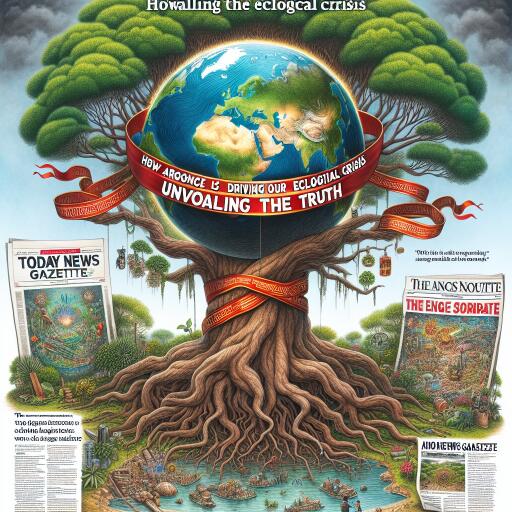
How Arrogance is Driving Our Ecological Crisis: Unveiling the Truth – 매일경제 – Today News Gazette
The deterioration of our planet’s ecological environment stems from a deep-rooted arrogance that pervades human attitudes towards nature. This pervasive mindset not only influences personal behaviors but also dictates the policies and practices we implement on a global scale.
The consequences of our disregard for ecological balance are profound, with human actions having a direct and devastating impact on the world around us. A pressing issue is the surge in carbon emissions due to industrial activities. Recent figures show that global CO2 emissions soared to roughly 36 billion tons in 2021, highlighting the dire need for prompt action.
Human-induced activities such as deforestation, overfishing, and the production of excessive waste spearhead environmental decline. Alarming reports indicate that nearly 80% of the world’s wetlands have been lost due to the relentless expansion of agriculture and urbanization, underscoring the unsustainability of current land use practices.
Cultural attitudes towards the environment significantly shape governing environmental policies. In myriad cultures, there exists a significant disconnect regarding the pivotal role ecosystems play in human survival. For example, a recent survey revealed that only a mere 30% of participants recognized the importance of their local biodiversity.
Promoting awareness is essential in reshaping perceptions about environmental stewardship. Educational institutions and communities around the world are gradually embedding sustainability within their curricula, urging younger generations to actively participate in the preservation of their habitats.
Globally, initiatives are in motion to counteract these challenges through cutting-edge solutions such as renewable energy sources, sustainable agricultural methods, and improved recycling programs. Denmark, for instance, has achieved remarkable progress, generating more than 47% of its electricity from wind energy—a promising blueprint for others to imitate.
Technology plays an indispensable role in advancing sustainable practices. Through smart technologies, we can optimize the use of resources. An example is precision agriculture, which enables farmers to apply water and fertilizers more efficiently while reducing waste, steering us towards more environmentally friendly farming techniques.
The current state of our ecological environment mirrors humanity’s prevailing values towards nature—a resounding wake-up call that demands immediate attention. Through united action, informed by educated perspectives and innovative solutions, we have the power to restore harmony between advancement and conservation for generations to come.
Recognizing our past missteps is essential if we are to carve out a new path—one where reverence for natural systems guides us toward sustainable living rather than further degradation.
As we confront this ecological crisis, it is imperative to move past our arrogant tendencies, showing humility in recognizing the vital role of nature, and forging a future of sustainable cohabitation with our planet. We must transition from a stance of taking and consuming to one of respect and preservation to ensure that future generations inherit a planet capable of supporting life. With an informed approach and collective effort, we can navigate towards a path where ecological balance and human progress coexist harmoniously.





Leave a Reply